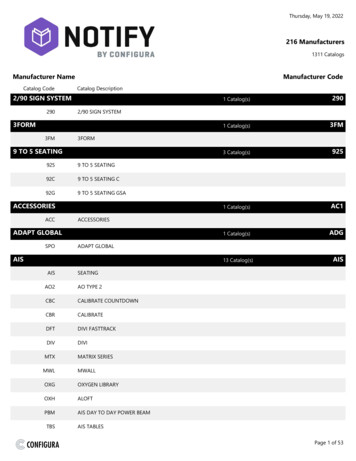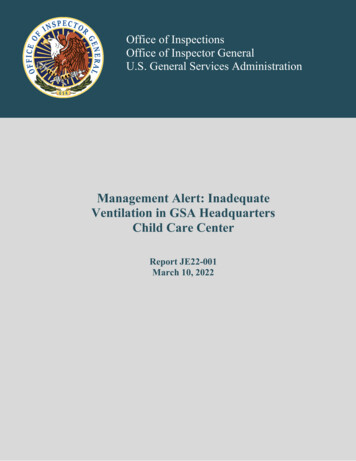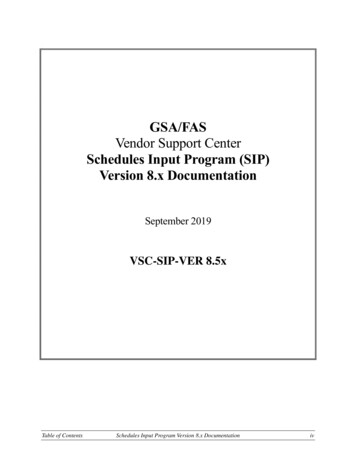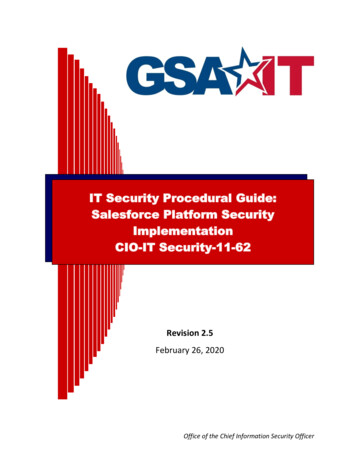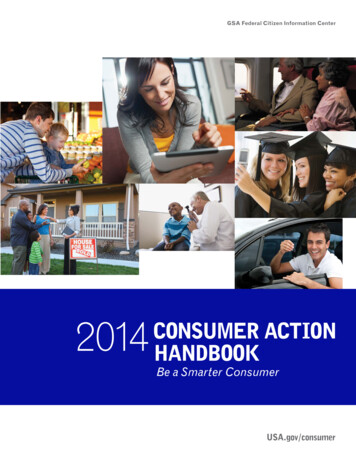
Transcription
GSA Federal Citizen Information Center2014CONSUMER ACTIONHANDBOOKBe a Smarter ConsumerUSA.gov/consumer
CONTRIBUTORSGSA Office of Citizen Services and Innovative TechnologiesJanuary 2014On behalf of the General Services Administration’s (GSA) Office of Citizen Services andInnovative Technologies, I welcome you to the 2014 Consumer Action Handbook. First publishedby the White House Office of Consumer Affairs in 1979 and transferred by Congress to GSA in1997, the Handbook continues to be one of the most popular publications from the federalgovernment. Whether you are looking for helpful tips on everyday consumer matters or you needtrustworthy guidance for major purchases, the Consumer Action Handbook can help you.It’s hard work being an informed consumer. The effort it takes to compare products, protect youridentity, and stay abreast of the latest scams can be a full time job. The Handbook makes iteasier, by compiling practical consumer information into one comprehensive resource. Eachedition of the Handbook covers topics that matter to you, such as buying a home, paying forcollege, and choosing a car repair shop. This year, I am excited to introduce new information onover 20 new topics, such as getting free copies of specialty consumer reports, timeshare resale,and affinity fraud. The sample complaint letter and directory of corporate and governmentconsumer protection agencies take the guesswork out of filing a complaint.The Consumer Action Handbook isn’t the only source for reliable information from thegovernment. Be sure to visit USA.gov and GobiernoUSA.gov (in Spanish) all year long to getanswers to your questions. If you prefer speaking to a person, call 1-800-FED-INFO (333-4636)to get answers to your questions. You can also order or download electronic versions of thisHandbook and hundreds of other government publications at Publications.USA.gov.Please let me know what you think of the Consumer Action Handbook and if you havesuggestions. I really am listening. Some content updates in this version are based on readers’comments. You can email action.handbook@gsa.gov or reach us on social media atwww.facebook.com/USAgov or twitter.com/USAgov.Sincerely,Marietta JelksEditor-in-Chief, Consumer Action HandbookThe Federal Citizen Information Center would like to express its gratitude to the partners listedbelow who helped make possible the publication of the 2014 Consumer Action Handbook.American Financial Services AssociationEducation FoundationNational Futures AssociationThe Colgate-Palmolive CompanyCity of Pueblo, CODepartment of Veterans AffairsSecurities and Exchange CommissionFederal Deposit Insurance CorporationFederal Trade CommissionSociety of Consumer Affairs ProfessionalsInternationalKellogg CompanyUnileverLeadingAgeU.S. Commodity Futures Trading CommissionMoney Management InternationalThe Procter & Gamble Company
January 2014Welcome to the Consumer Action Handbook.From buying a home to raise a family in to securing a loan to pursue an education,financial decisions have tremendous potential to make our lives better. Havingthe tools to understand and make the most of these decisions is vital not only toindividuals, but also to our economy, which is fueled by consumers.That is why my Administration remains committed to strengthening consumerprotections and helping people make sound decisions in the marketplace. We areworking with the Department of Justice and independent regulators to fight forconsumers by taking enforcement action against deceptive practices, replacingconfusing language in financial documents, and providing educational resourcesso Americans can make informed choices.The Consumer Action Handbook is one of these important resources. Withpractical tools and tips on a broad range of topics, including credit and loans,insurance and identity theft, and mobile purchases, this handbook can helpindividuals and families navigate their financial future.I encourage all Americans to take advantage of this valuable information, whichis also available online with interactive features at www.USA.gov/Consumer.GSA AdministratorJanuary 2014Welcome to the 2014 edition of the U.S. General Services Administration’s (GSA) ConsumerAction Handbook. The mission of GSA is to deliver the best possible value to the governmentand the American people. This handbook offers the American people the resources and advicethat they will need to help them achieve those kinds of savings in their everyday lives.Every day the women and men of GSA are committed to providing cost savings, efficiency, andexcellent customer service -- both for our partners and for the American people. These are goalsthat everyone can relate to. Every American wants to get the most for their money. GSA isproud to offer this Handbook full of practical tips to help you achieve the same goals that we areworking toward across government.This Handbook will assist you in making informed choices when buying the products andservices that matter to you. Topics such as loans, mobile phones and housing, along withinformation on the latest frauds and scams are all included. It also provides the resources youneed to ensure that you are getting the support and protection you need as a consumer.This Handbook, which is updated annually by GSA’s Office of Citizen Services and InnovativeTechnologies, is also available online with interactive features at USA.gov/consumer. I hopethat you take advantage of this Handbook and the information it provides, and share it with yourfamily and friends.Sincerely,Dan TangherliniActing Administrator1-800-FED-INFO (800-333-4636)2014 Consumer Action HandbookI
QUICK CONSUMER TIPSUSING THIS HANDBOOKThis everyday guide to being a smart shopper is full ofhelpful tips about preventing identity theft, understandingcredit, filing a consumer complaint, and more. Theinformation and resources you will need are arranged asfollows:PART I—BE A SAVVY CONSUMERRead this section for advice before you make a purchase.To quickly locate specific topics and information, look in theTable of Contents (p. 1) and Index (p. 139).PART II—FILING A COMPLAINTTurn to this section for suggestions on resolving consumerproblems. The sample complaint letter on page 57 will helpyou present your case.PART III—KEY INFORMATION RESOURCESLook here for a list of public resources for teachers,disabled consumers, and military families.PART IV—CONSUMER ASSISTANCEDIRECTORYHere you will find contact information for corporate offices,consumer organizations, trade groups, governmentagencies, and more.VISIT US ONLINEA searchable version of this Handbook is available online atwww.USA.gov and in Spanish at www.GobiernoUSA.gov.You can also order or download an electronic version of theHandbook and hundreds of other consumer publications atPublications.USA.gov.QUICK CONSUMER TIPSAs a savvy consumer, you should always be on the alert forshady deals and scams. To avoid becoming a victim, keepthese things in mind:1. A deal that sounds too good to be true usually is! Bewary of promises to fix your credit problems, lowinterest credit card offers, deals that let you skip creditcard payments, work-at-home job opportunities, riskfree investments, and free travel.2. Don’t share personal information with someone youdon’t trust. Learn how to recognize fraud.3. Beware of payday and tax refund loans. Interest rates onthese loans are usually excessive. A cash advance on acredit card may be a better option.4. Read and understand any contract, legal document orterms of service before you sign or click “I Agree”. Donot sign a contract with blank spaces or where the termsare incomplete. Some contracts include a clause thatprohibits you from taking legal action and require you toengage in mandatory arbitration with a company in thecase of a dispute.5. Get estimates from several contractors for home or carrepairs. Make sure the estimates are for the exact samerepairs for a fair comparison.6. Before you buy, make sure you understand and acceptthe store’s refund, return and early termination/cancellation policies, especially for services andfacilities that charge monthly fees.7. When paying for your purchases, double-check the finalprice. If you think the price that has been charged isincorrect, speak up. Remember, when shopping online,your purchase may include additional fees, such asshipping, handling, and convenience fees that are notcalculated until you check out.8. When shopping online, look for the padlock icon inthe bottom right-hand corner of your screen or a URLthat begins with “https” to ensure that your paymentinformation is transmitted securely.9. Don’t buy under stress. Avoid making big-ticketpurchases during times of duress (e.g., coping with adeath or debt).10. If you are having difficulty making payments on loans,notify your lender immediately so that you can work outa payment plan.IIwww.USA.govTo contact an organization, use the directory beginning on page 62.
TABLE OF CONTENTSPART I: Be a Savvy Consumer. 2Buyer Beware. 2Before You Buy.2Service Contracts And Extended Warranties.2Product Safety Recalls.3Identifying And Stopping Fraud.3Shopping From Home.3After You Buy.5Banking. 5Savings And Checking.6ATM/Debit Cards.7Unsolicited Checks And Credit Offers .7Prepaid Cards.7Cars. 8Buying A New Car.9Buying A Used Car .9Dealer Versus Private-Party Purchases.10FInancing.10Leasing.10Recalls, “Lemon” Laws, And Secret Warranties. 11Renting. 11Repairs.12Car Repossessions .12Credit.12Credit Cards.13Credit Reports And Scores.14FICO.14Dealing With Debt .15Loans.16Education.17Paying For College 101.17Employment. 19Employment Agencies And Recruiters.19Work-At-Home Companies .19Food And Nutrition. 20Healthy Food Choices.20Food Safety.21Saving Money On Groceries.21Organic Foods.21Going Green. 22Buying Green.22Reusing And Recycling.22Health Care. 23Choosing A Doctor.23Choosing A Health Care Facility .23Prescription Drugs .24Medicare Prescription Drug Coverage.25Advance Medical Directives .25Housing. 26Buying A Home.26Avoiding Foreclosure.28Moving Companies.28Home Improvement And Repairs .28Renting/Leasing.291-800-FED-INFO (800-333-4636)Insurance. 30Auto Insurance.30Disability Insurance.30Health Insurance.31Health Care Plans.31Homeowners/Renters Insurance.32Life Insurance.32Long-Term Care Insurance.33Other Insurance .33Investing. 33Online Trading.35Financial Brokers And Advisors.35Investing In Gold And Commodities .36Retirement Planning.36Privacy And Identity Theft. 37Reporting Identity Theft.37Protecting Your Privacy.37Financial Privacy.38Medical Privacy.38Online Privacy.39Telecommunications. 39Internet.40Phones.42TV.44Telemarketing And Unwanted Mail. 45National Do Not Call Registry.45Pre-Recorded Messages.46Telemarketing Sales Calls.46Travel.47Resolving Air Travel Problems.48Cruises.49Travel Safety.50Utilities. 50Starting Utility Service.50Billing.50Wills And Funerals.51Wills.51Funerals.52Veterans Cemeteries.53PART II: Filing a Complaint. 54Contact The Seller.54Contact Third Parties.54Dispute Resolution Programs.55Small Claims Court.55Legal Help And Information.55Report Fraud And Safety Hazards.56Sample Complaint Letter.57PART III: Key Information Resources. 58Emergency Preparedness.58For Teachers.58For Persons With Disabilities.59For Military Personnel.59PART IV: Consumer Assistance Directory. 622014 Consumer Action Handbook1
PART I: BE A SAVVY CONSUMERBUYER BEWAREQUICK TIPS FOR AVOIDING FRAUDThere are many varieties of consumer fraud, but the mostcommon ones are variations of fake check scams, creditrepair, free trip offers, and sweepstakes. Here are sometips to help you avoid being a victim: Don’t give out personal information. Be suspiciousof anyone you don’t know who asks for your SocialSecurity number, birthdate, credit card number, bankaccount number, password, or other personal data.BEFORE YOU BUYTo avoid problems and make better decisions, use thischecklist BEFORE you make a purchase: Decide in advance exactly what you want and what youcan afford. Do your research. Ask family, friends, and others youtrust for advice based on their experience. Gatherinformation about the seller and the item or service youare purchasing. Review product test results from consumer experts andcomments from past customers. See Key InformationResources (p. 58). Get advice and price quotes from several sellers. Make sure the seller has all appropriate licenses. Doctors,lawyers, contractors, and other service providers mustregister with a state or local licensing agency. Check out a company’s complaint record with your localconsumer affairs office (p. 107) and Better BusinessBureau (p. 65). Get a written copy of guarantees and warranties. Get the seller’s refund, return, and cancellation policies. Ask whom to contact if you have a question or problem. Read and understand any contract or legal document youare asked to sign or give agreement to online(by clicking “I Agree”). Make sure there are no blankDRIP PRICINGHave you ever planned to make a purchase, only to findout that there are additional, sometimes mandatory,fees that were not included in the advertised price? Ifso, you have been the victim of drip pricing. Drip pricingmakes it difficult for consumers to determine the full costand compare similar options, when all the fees are notdisclosed up front. You can protect yourself by reading thepolicies before completing the sale and asking questions ofsales personnel. Also, if you have charged your purchaseon your credit card, you may be able to dispute the extrafees if they are more than you had agreed to with the seller.2www.USA.gov Don’t be intimidated. Be suspicious of calls or emailsthat want you to provide or verify personal informationimmediately. Answer that you are not interested andhang up or don’t reply to the email. Monitor your accounts. Review bank and creditcard statements carefully, and report unauthorizedtransactions to your financial institution immediately. Use a shredder. Tear or shred credit offers, bankstatements, insurance forms, and other papers withpersonal information.spaces or the terms are incomplete. Insist that any extrasyou are promised be put in writing. Consider paying by credit card. If you have a problem, youcan dispute a charge made on your credit card(p. 13). Don’t buy on impulse or under pressure; this includesdonating to charity.SERVICE CONTRACTS AND EXTENDEDWARRANTIESService contracts or “extended warranties” extend theguarantee or promise that a product will work, for anadditional cost. Sellers offer these service contracts atthe time of purchase. Third party firms may also try to sellyou a warranty; some even make cold calls to you withhigh pressure sales tactics. Some extended warrantiesduplicate warranty coverage that you get automatically froma manufacturer or seller, so this add-on may not be worththe cost. Ask these questions before you agree to one ofthese contracts: Does the dealer, the manufacturer, or an independentcompany back the service contract? How are claims handled? Who will do the work, andwhere will it be done? What happens to your coverage if the dealer oradministrator goes out of business? Do you need prior authorization for repair work? Are there any situations when coverage can be denied?You may not have protection from common wear andtear, or if you fail to follow recommendations for routinemaintenance.To contact an organization, use the directory beginning on page 62.
BUYER BEWAREBefore you buy a used or second-hand product, check to besure that it has not been recalled for safety reasons. Somerecalls ban the sale of an item, while others ask consumersto return the item for replacement or repair. Sometimes, aseller will provide a part that reduces the danger of usingthe product.If you are buying a product for a child, such as toys, clothing,cribs, and costume jewelry, be especially careful. Visit thewebsites in the “Check Here for Recalls” box to find thelatest safety recalls. You can also sign up for free emailnotifications at www.recalls.gov/list.html or download themobile app from apps.usa.gov.IDENTIFYING AND STOPPING FRAUDLook for these warning signs to avoid fraud: You are asked for your bank account or credit cardnumber. Someone you do not know offers you the chance toreceive a credit card, loan, prize, lottery, or other valuableitem, but asks you for personal data to claim it. The solicitation looks like a government document andsuggests that contest winnings or unclaimed assets areyours for a small fee. (The government does not solicitmoney from citizens.) Someone you do not know asks you to send money ormoney orders to claim a prize, lottery, credit card, loan, orother valuable offer. An unknown caller claiming to be a lawyer or in lawenforcement offers to help you get your money back(for a fee). The deal is only good “for today” or a short time. A “repair person” suddenly finds a dangerous defect inyour car or home. You are given little or no time to read a contract. A sale item is suddenly unavailable, but a “much betteritem” is available for slightly more money. Someone is trying to scare you into making a purchase.To learn more about avoiding identity theft and fraud, go topage 37.SHOPPING FROM HOMELate delivery, shipment of wrong or damaged items, andhidden costs are common complaints when consumersshop from home. To avoid problems and resolve them moreeasily, follow the advice in the Before You Buy checklist (p.2). In addition, here are some general tips: Be wary of post office boxes and sellers in othercountries. It may be difficult to find the seller to resolve aproblem later. Know the total price. Make sure it includes all charges,shipping, handling, insurance, and taxes. Coupons andother discounts should be deducted properly.1-800-FED-INFO (800-333-4636)CHECK HERE FOR RECALLS w ww.recalls.gov lists government-initiated recalls fromfederal agencies. w ww.nhtsa.gov publishes safety information onvehicles and equipment such as children’s car seats. w ww.fsis.usda.gov lists recalls that involve meat,poultry, or processed egg products. w ww.fda.gov lists recalls that involve food, medicines,medical devices, cosmetics, biologics, radiationemitting products, veterinary drugs and pet food. R eport incidents and safety concerns with consumerproducts, search for incidents, reported by others atwww.saferproducts.gov. Make sure you are clear on what you are buying.Watch for words such as “refurbished,” “reconditioned,”“closeout,” or “discontinued.” The security code on the back of your credit card offersyou extra protections on online purchases. Keep a record of your purchase. Save any informationthe seller gives you, such as order confirmation number,product description, delivery date, cancellation policy,privacy policy and warranties. Keep track of your order. If it’s late, you have the rightto cancel and demand a refund.DYNAMIC PRICINGHave you ever viewed a product while shopping online, andnoticed that the price had changed from when you lookedat it yesterday? You have experienced dynamic pricing,when a retailer changes an item’s price multiple times overa few days, or even within hours.Dynamic pricing practices are common with onlineretailers, airlines and tickets for professional sportingevents. Retailers adjust prices based on their inventory,your shopping history on their site, and your onlinebrowsing behavior. Sports teams may adjust ticket pricesbased on how well the team is performing, ticket inventoryand even the day of the week. Make dynamic pricing workto your advantage by: Using price tracker websites to compare the prices atdifferent retailers. Using price predictor websites to track if the price isexpected to go up or down. Clearing your Internet cookies so online retailerscannot use your browsing history to adjust prices.2014 Consumer Action Handbook3BUYER BEWAREPRODUCT SAFETY RECALLS
BUYER BEWAREGREY CHARGES“What’s this charge?” may be your first thought when yousee a small charge on your credit card statement that youcannot figure out. These are known as “grey charges” andthere are several common types: Unintended subscriptions. You thought you made aone time purchase, but it was really a subscription.3-Day Cooling-Off RuleThis federal law protects consumers in their homesduring door-to-door sales pitches or at sales in temporarybusiness locations. According to the FTC, the 3-DayCooling-Off Rule does NOT apply to the purchase of newautomobiles or items sold online. It only applies when acompany is selling something that costs 25 or more at alocation other than its regular place of business. Zombie fees. Membership fees that you had cancelled,but the fees will not stop.To comply with the 3-Day Cooling-Off Rule, a seller mustinform buyers of their right to cancel the sale and receive afull refund within three business days. Free trial to paid. When a free trial is over the sellerconverts it to a paid subscription.Be aware that there are situations in which the Cooling-OffRule does not apply: Negative option. You bought one product, but did notrealize that you were buying others at the same time. You made the purchase entirely by mail, online, ortelephone. The sale was the result of prior contact you had at theseller’s permanent business location. You signed a document waiving your right to cancel. Your purchase is not primarily for personal, family, orhousehold use. You were buying real estate, insurance, securities, or amotor vehicle. You cannot return the item in a condition similar to howyou received it.Remember, if you paid by credit card and are havingdifficulty getting your refund, you may also be able todispute the charge with your credit card companyunder the Fair Credit Billing Act. See Credit Card BillingDisputes (p. 13).Take these steps to protect yourself from grey charges: Before you buy, read the terms of service. Disclosuresabout fees may be hidden or near the end, so read theentire document. Mark your calendar as a reminder to cancel free trials bya set date. Read your credit card statements closely. Pay attentionto the names of companies and charges for smallamounts. Contact the seller to have the grey charges removed. Dispute the charges with your credit card company.Your RightsWhen you order something by mail, phone, or online,the Federal Trade Commission (FTC) requires the companyto: Ship the merchandise within the time promised, or ifno specific delivery time was stated, within 30 days ofreceiving your order. Notify you if the shipment cannot be made on time andgive you the option of waiting longer or getting a refund. Cancel your order and return your payment if the newshipping date cannot be met, unless you agree to anotherdelay.If you cancel your order, your money must be refundedwithin seven days; if you charged the order on a credit card,your account must be credited within one billing cycle. Thecompany cannot substitute a store credit. If you applied fora charge account with the merchant at the same time thatyou placed your order, the company has an extra 20 daysto ship the merchandise to allow time for processing yourcredit application.These FTC rules only apply to the first shipment ofmagazine subscriptions or other merchandise you receiverepeatedly. Your state may also have rules that apply.Report suspected violations to your state or local consumerprotection agency (p. 107) and to the FTC (p. 103).4www.USA.govOnline ShoppingOnline shopping websites often offer great deals, variety,and convenience. However, consumers need to be carefuland make informed decisions about their purchases. Sometips for shopping safely online: Stick to websites that are known or recommended. Compare prices and deals, including free shipping,extended service contracts, or other offers. Search for online coupons, known as promo codes,which may offer discounts or free shipping. Get a complete description of the item and partsincluded, and the price, including shipping, deliverytime, warranty information, return policy, and complaintprocedure.BUYING TICKETS ONLINEWhen buying tickets online, be mindful of convenienceor venue fees that can raise the price. Also, be mindfulof the fine print. Some tickets are tied to your credit card,restricting your ability to donate, give them as gifts orresell them if you cannot attend be
PB 1-800-FED-INFO (800-333-4636) 2014 Consumer Action Handbook I GSA Administrator January 2014 Welcome to the 2014 edition of the U.S. General Services Administration's (GSA) Consumer Action Handbook. The mission of GSA is to deliver the best possible value to the government
